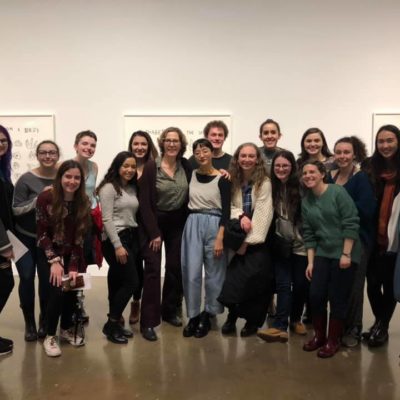
American Sign Language (ASL) is estimated to be the third most used language in the United States, and its visibility in society is on the rise in recent years. There are between 500,000–2,000,000 Deaf, DeafBlind, or hard of hearing people in the United States who use ASL as their primary language and a there are a large number of non-Deaf signers who use or learn ASL as a second language.
Broad societal misunderstanding of Deaf, signing people’s minority language and culture—their lived experience—creates barriers to educational and economic opportunity. While state and federal legislation enables improved civic engagement by Deaf, hard of hearing, and DeafBlind individuals, there is continued need to elevate quality of life, equity, and the rich contributions of the diverse members of the American Deaf Community.
The curriculum in the American Sign Language and Interpreting Education program addresses social inequalities and contributes to cultural resilience by raising awareness of the minority population of ASL users: Deaf, hard of hearing, and DeafBlind individuals.
Professional ASL-English interpreting is an important service that supports Deaf, hard of hearing, and DeafBlind people’s efforts to participate, be recognized, and contribute to civic society equally at all levels. There continues to be a shortage of qualified sign language interpreters in all domains of civic life since the emergence of the profession in the early 1960s. There is ongoing need for advancing research on ASL and on sign language interpreting to contribute to the growing literature.
The Bachelor of Science in American Sign Language-English Interpreting curriculum is a rigorous program of study that integrates a foundation of ASL and Deaf studies with intensive interpreting skill development. This program is designed to assist students in acquiring competence in ASL, developing an understanding of the diverse American Deaf Community and its culture, and applying linguistic, analytic, and sociocultural skills and knowledge in order to contribute to civic engagement and social justice for Deaf citizens. Students acquire the complex skills of ASL-English interpreting through intensive faculty instruction and direct student support and guidance, which is similar to training in other practice professions (such as law, medicine, and social work).
The major in ASL-English Interpreting is a sequence of courses in linguistic, cognitive, human relations, and ethical decision-making skills as well as the sociocultural knowledge necessary to prepare students for future state or national credentialing as professional ASL-English interpreters.
Combined majors are offered alternatively for students who do not wish to pursue an interpreting career yet want to gain appropriate ASL and cultural skills to work alongside and on behalf of Deaf, hard of hearing, or DeafBlind people in the disciplines of human services, psychology, linguistics, or theatre/arts.
The program offers a wide array of courses as well as volunteer, internship, and practicum opportunities to learn from Deaf citizens’ lived experiences through community and industry connections and research.
-
Type of Program
- Undergraduate Program


